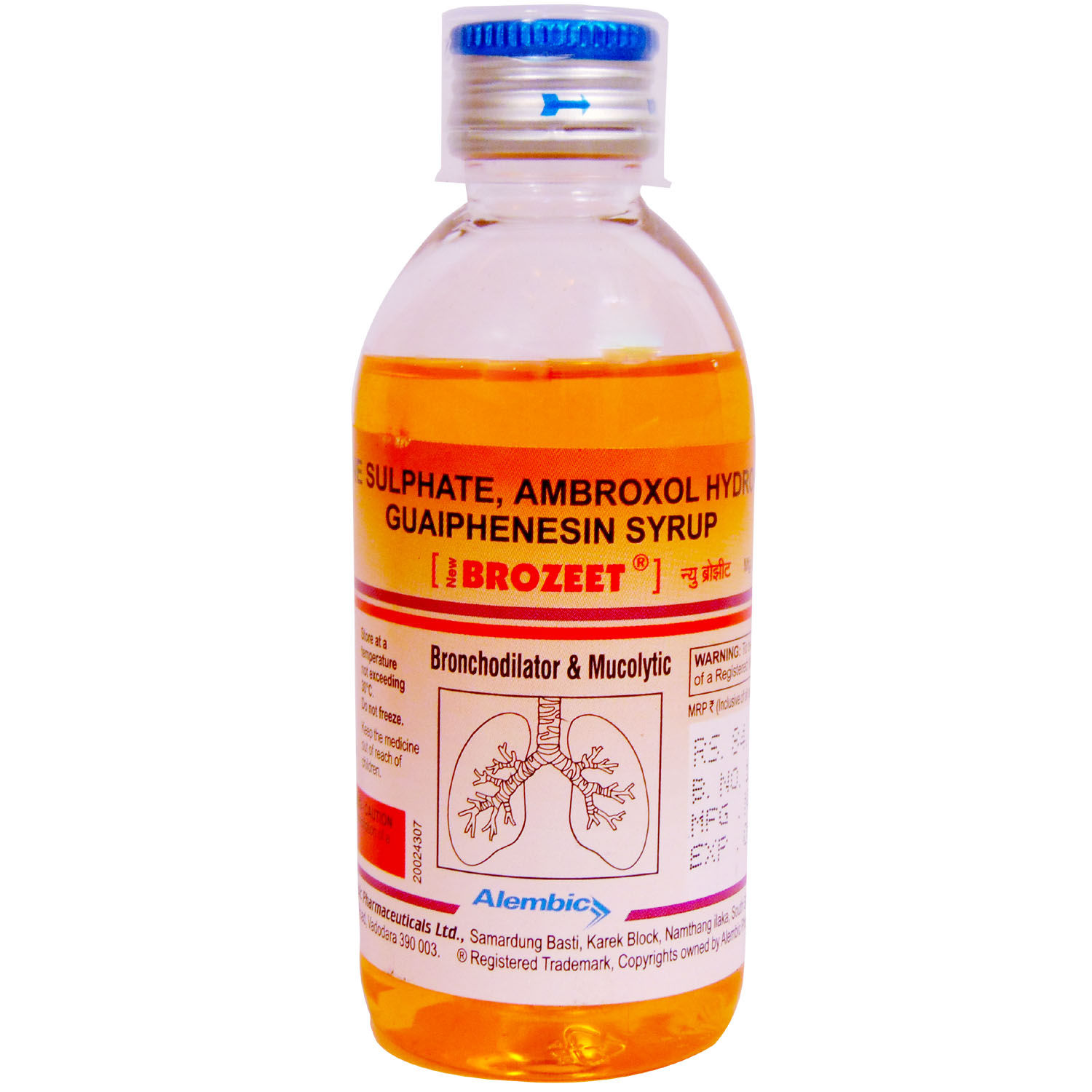Amrox Cough Syrup 60 ml
₹63*
MRP ₹70
10% off
₹59.5*
MRP ₹70
15% CB
₹10.5 cashback(15%)
Free Delivery
With Circle membership
(Inclusive of all Taxes)
This offer price is valid on orders above ₹800. Apply coupon PHARMA10/PHARMA18 (excluding restricted items)
Know Your Delivery Time
Provide Delivery Location

Whats That

Secure Payment

India's Most Trusted Pharmacy

Genuine Products
Manufacturer/Marketer :
Consume Type :
Return Policy :
Expires on or after :
About Amrox Cough Syrup
Amrox Cough Syrup belongs to the class of medicines called expectorants primarily used to treat cough associated with mucus. Coughing (dry or productive) is a body's way of clearing irritants (like allergens, mucus or smoke) from airways and preventing infection. There are two types of coughs, namely: Dry cough and chesty cough. A dry cough is tickly and doesn't produce any vicious or thick mucus, while a chesty cough (wet cough) produces mucous or sputum.
Amrox Cough Syrup contains Ambroxol, Guaiphenesin and Terbutaline. Ambroxol works by thinning and loosening phlegm (mucus) in the lungs, windpipe and nose. Guaiphenesin increases the volume of fluid in the airways, reduces the stickiness of mucus, and removes it from the airways. Terbutaline relaxes muscles and widens the airways. Thereby, it makes breathing easier. Together, Amrox Cough Syrup helps provide relief from cough.
Your doctor will recommend the dose and duration based on your medical condition. In some cases, you may experience common side effects such as nausea, vomiting, drowsiness, headache, dizziness, nervousness, and stomach upset. Most of these side effects do not require medical attention and gradually resolve over time. However, if the side effects persist or worsen, please consult your doctor.
Consult your doctor if you are pregnant or breastfeeding. Amrox Cough Syrup should be used with caution in children if prescribed by a doctor. If you are suffering from fits or have a history of fits, please inform your doctor before taking Amrox Cough Syrup as it may increase the risk of recurrent fits. If you have diabetes, regular monitoring of blood sugar levels is recommended while taking Amrox Cough Syrup. Keep your doctor informed about your health condition and medications to rule out any interactions/ side effects.
Uses of Amrox Cough Syrup
Medicinal Benefits
Amrox Cough Syrup is a combination of three drugs, namely: Ambroxol, Guaiphenesin and Terbutaline. Ambroxol belongs to the class of mucolytic agents (cough/sputum thinner) that works by thinning and loosening phlegm (mucus) in the lungs, windpipe and nose for coughing out easily. Guaiphenesin belongs to the class of expectorants; it increases the volume of fluid in the airways, reduces the stickiness of mucus, and removes it from the airways. Terbutaline is a bronchodilator that relaxes muscles and widens the airways. Thereby, it makes breathing easier. Together, Amrox Cough Syrup helps provide relief from cough.
Side Effects of Amrox Cough Syrup
- Nausea
- Vomiting
- Stomach upset
- Drowsiness
- Dizziness
- Headache
Directions for Use
Storage
Drug Warnings
Avoid taking Amrox Cough Syrup if you are allergic to any of its components. If you are pregnant or breastfeeding, it is advised to inform your doctor. Drive only if you are alert after taking Amrox Cough Syrup as it may cause dizziness or drowsiness in some people. Inform your doctor if you have diabetes, fits, high blood pressure, overactive thyroid, stomach ulcers, phenylketonuria (a congenital disability that causes accumulation of amino acid, phenylalanine in the body), kidney, liver or heart problems.
Therapeutic Class
Drug-Drug Interactions
Drug-Food Interactions
Diet & Lifestyle Advise
- Avoid dairy products such as milk, as it may increase mucus production.
- Avoid processed or refined foods. Replace baked foods, fried foods, white bread, white pasta, french fries, sugary desserts and chips with green leafy vegetables.
- Drink plenty of fluids to avoid a dry throat. It also helps loosen mucus.
- Avoid citrus fruits as they may worsen the cough.
- Eat fruits rich in water content, such as pears, watermelon, peaches and pineapples.
Habit Forming
How Amrox Cough Syrup Works
What if I have taken an overdose of Amrox Cough Syrup
Alcohol
Caution
Interaction of alcohol with Amrox Cough Syrup is unknown. Please consult a doctor before consuming alcohol with Amrox Cough Syrup.
Pregnancy
Caution
The safety of Amrox Cough Syrup in pregnant women is unknown. Consult your doctor if you have any concerns; your doctor will prescribe only if the benefits outweigh the risks.
Breast Feeding
Caution
It is unknown whether Amrox Cough Syrup is excreted in human milk. Consult your doctor if you have any concerns; your doctor will decide if Amrox Cough Syrup can be taken by breastfeeding mothers or not.
Driving
Caution
Amrox Cough Syrup may cause dizziness or drowsiness in some people. Therefore, drive only if you are alert after taking Amrox Cough Syrup.
Liver
Caution
Take Amrox Cough Syrup with caution, especially if you have a history of liver problems. The dose may be adjusted by your doctor as required.
Kidney
Caution
Take Amrox Cough Syrup with caution, especially if you have a history of kidney problems. The dose may be adjusted by your doctor as required.
Children
Caution
Amrox Cough Syrup should be used with caution in children if prescribed by a doctor.
Country of origin
Manufacturer/Marketer address
Author Details
We provide you with authentic, trustworthy and relevant information
FAQs
Disclaimer
Product Substitutes












